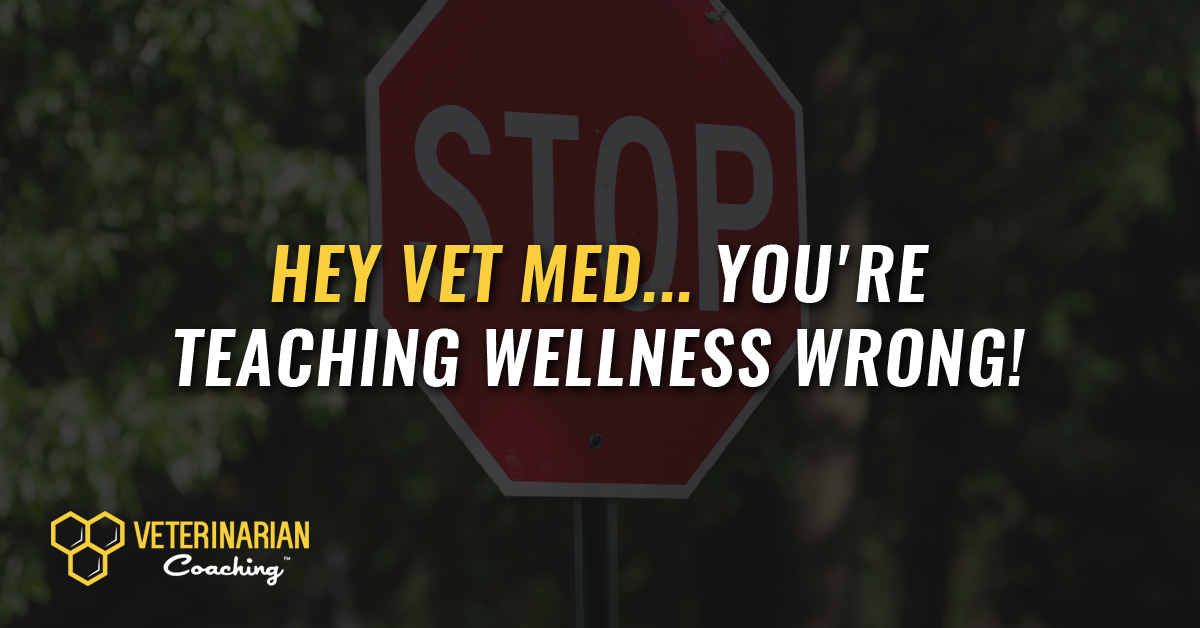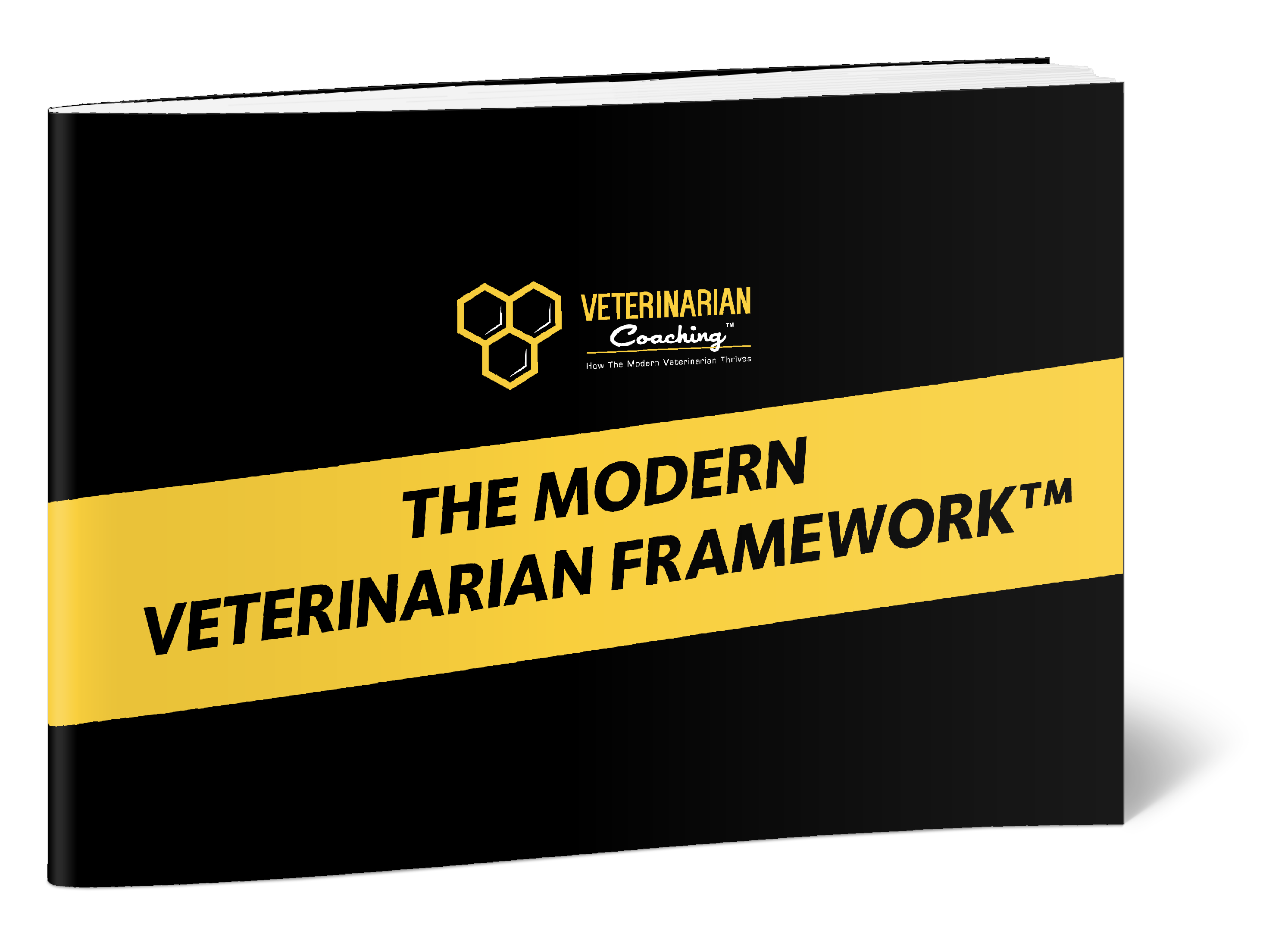19, 2019

Hey Vet Med…You’re Doing It Wrong!
Hey Ved Med… You’re doing it wrong!
Doing what wrong?
You know, this Well-being/Wellness problem that you’re trying to solve. It’s tragic to see what’s going on within the profession. Individuals suffer from depression, resist seeking help, contemplate suicide, and even die by suicide. You’re an amazing group of people and I don want you to endure unnecessary suffering.
You are trained helpers and we know you want to help. Unfortunately what you are doing is not going to be effective in the way you want. Here’s why what you’re currently doing won’t work.
- You’re being reactive. Reactive is a response of the sympathetic nervous system … In other words, you’re in the fight, flight, or freeze mode trying to solve problems for people already in fight, flight, or freeze. You’re not in solution mode. If you want to help those already “under threat” you need to “back off” the pressure much like you would a fractious cat.
- You want people to do more.You are telling the already overwhelmed that they need to add more things like meditation and mindfulness to their day. They already can’t see the light of day and you’re wanting them to do more? Even if mindfulness is taught and easy to do, it’s still just one more thing on the never-ending list of “to-dos”.
- You’re trying to solve it from the inside. What I mean is you’re trying to get veterinarians with veterinary thinking to solve their own issues. Forgive me if I’m wrong, but I don’t think Veterinarians are experts in human wellness or mental health. Sure you have brought in some mental health professionals, but refer back to #2. Social workers and mental health professionals are important, but I haven’t seen anyone from the Health Promotion and Wellness industry brought in. In case you are not familiar, Health and Wellness programs are all about teaching positive changes. My overall belief is that the veterinary profession needs some combination of mental health, social work and wellness programming.
- Broad messaging gets poor results. When you educate the masses, it doesn’t really get through to any of those that need to hear it most. Those that do hear the message are either going to ignore it because they have “heard it before” or they are in the “that’snot me” camp. You might want to consider talking in specifics, not in broad and sweeping terms. The specific message will be different, and likely more effective.
- You’re only focused on what’s been happening. You are trying to solve the future by looking into the past. Sure, there needs to be an understanding of what has created the current situation, and then we need to avoid getting stuck in the “why”. veterinary medicine needs to focus on the “how” or think in terms of generative change. Remedialchange is problem-focused, generative change is solution-focused.
I suspect some of you will disagree with me on at least one or two or my arguments, and I welcome and encourage you to share your point of view.
Let’s move onto the big question … how does Veterinary Medicine start to solve some of its’ well-being/wellness issues? We could get into the conversation of how students are selected for veterinary training, but that’s beyond the scope of this post.
Let’s talk instead about teaching and building habits; a foundation of habits will set you free from some of your daily stressors. Remember when you were in school and you had to really focus on how to hold and manipulate surgical instruments, feeling awkward all the way? At some point, you develop more proficiency in surgery and using instruments, and don’t have to think about what you’re doing. This is an example of habit formation.
So to be healthy, what habits do people really need to learn? I’m glad you asked and here are a few that come to mind.
- Waking up ready for the day versus waking up feeling like you are being hunted. Most of us wake up under “threat” feeling like we are being hunted. We call it an alarm clock, but our amygdala treats it like a bear in the woods chasing us. Why do we need an alarm clock to wake up? Because most of us aren’t sleeping well enough to recover for our day.
- Preparing for sleep as though it’s your job. Remember when you were a kid and had a set bedtime routine? Maybe a shower, a book, a glass of water and then get tucked in for the night? We tend tolose those habits as adults, in actuality, those habits will help your mind and body to prepare for sleep and rest so you are recovered to deal with the next day. Not sleeping isn’t a good option; neither is taking medications to get to sleep each night. Give yourself at least 1 hour prior to sleep to let your body unwind: no phones, laptops or tablets, no strongly emotional TV shows and make sure your bedroom is free of distractions (including too much light or noise).
- You control your schedule, not the client. Veterinarians by nature are empathetic and want to help animals in need but that does not mean you need to be walked all over. We all deal with that last-minute client; the one who has to be seen at 4:45 (when you are closing at 5); or the student who shows up the week before finals wanting to know what they can do to pass the course (even when it’s not mathematically possible). Do emergencies happen? Absolutely. And even if you are an individual who takes on-call hours, you still have the opportunity to control when/where you will see patients. Taking care of everything IS NOT your job.
- You are a medical professional, not a service or retail business. We want to believe that “the customer/client is always right” but there are many times that your medical knowledge will outrank that of your client. I don’t encourage you telling clients that directly … but I do think you should make firm recommendations and have honest discussions based on your professional training. If the client is not happy with your medical assessment, there is always an opportunity for them to pursue a second opinion. Be nice to clients, but don’t
feel like you have to do everything they suggest/recommend (especially if it is contraindicated). - Your communication and influence skills extend beyond the walls of the hospital. The way you are perceived as a professional extends from your workplace to your personal life. Community members know that you are a veterinarian; they know you are smart and generally speaking they respect what you do. The way you talk about patients and clients (especially when outside of the workplace and on social media) is a reflection on the veterinary profession as a whole and you have to be conscious of that influence. Remember that you control your attitude, not anyone else. You can ALWAYS choose to direct your thoughts and actions in a positive manner, rather than spiraling in a negative loop. Consider shifting your communication style with clients, colleagues, and family as if you had a veterinary student or undergraduate shadowing your every discussion.
- Negotiation skills when you are looking for a job or need to review a contract. As a veterinarian, you were likely not well trained on how to read people’s emotions and actions nor how to create and review an employment contract. You were trained in problem-solving and that is a big benefit when it comes to negotiation. Think about the issue from the other person’s point of view – what do they need or want? How can you help them? Those questions alone will lead you to think about how you can approach the topic of negotiation. Having awareness of what the other party wants can empower you to ask for more or consider topics you may not have seen otherwise. I’m not encouraging you to do this alone, be sure to consult with an attorney before you sign a final document.
Veterinary Medical Doctors: You are an amazing group of people. You know medicine, surgery, behavior, wellness, and nutrition. You help patients every day, whether or not you work in a clinical setting. Pick one or two of the habits above to focus your energies on and keep striving to be the best version of yourself, personally and professionally. Remember that you do not have to be THE expert in everything. You can, however, be the expert in YOU and what you need to feel rested, recovered, fulfilled and energized. If you need a little guidance or just a sounding board, the Coaches at VeterinarianCoaching are here to help. If you know someone who needs help getting these ideas implemented, please share this with them. They deserve to Thrive in this profession, so let’s get them there.
P.S. Whenever you’re ready… here are 3 ways we can help you grow in your personal and professional life:
- Join The Modern Veterinary Professional (MVP) Group and connect with other veterinary professionals who are growing and scaling their life and career too. It’s our new Facebook community where Modern Veterinarian Professionals learn to have more
income, impact, and freedom. — Click Here - Join our Modern Veterinarian Coaching Program and be a Case Study. We are putting together a new coaching case study group at Veterinarian Coaching next month… stay tuned for details. If you’d like to work with us on your life and career… just reply to this message and put “Case Study” in the subject line.
- Work with us privately. If you’d like to work directly with us to take you from where you are to where you want to go… just reply to this message and put “Private” in the subject line… tell us a little about your career and what you’d like to work on together, and we’ll get you all the details!

